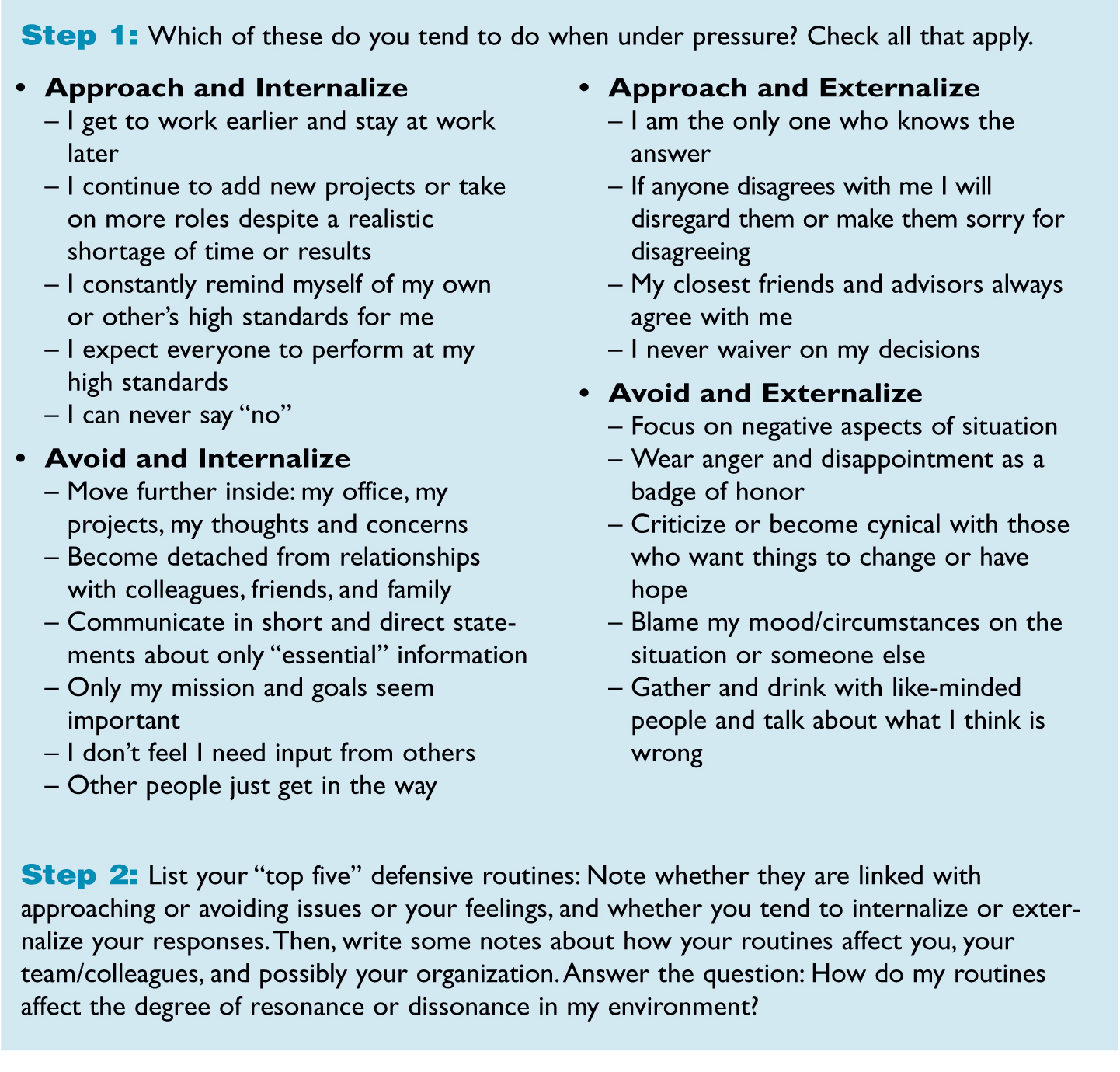In Resonant Leadership: Renewing Yourself and Connecting with Others Through Mindfulness, Hope, and Compassion (Harvard Business School Press, 2005), Richard Boyatzis and Annie McKee reveal an important message for today’s business executives looking to maintain their effectiveness over the long run. Through contemporary case studies and their own consulting experiences, the authors show how mindfulness, hope, and compassion— elements that may seem alien to the corporate world—can serve as the cornerstones of successful and sustainable leadership. In addition to demonstrating the significance of these foundational principles, Boyatzis and McKee provide numerous exercises to help readers develop skills in all three areas. Through these practices, leaders can not only inspire others but maintain their own sense of passion and purpose.
The “Sacrifice Syndrome”
The authors start by emphasizing that, before leaders can build the foundations for resonant success, they must learn to avoid creating dissonance. One way in which people commonly create dissonance in their organizations is by falling prey to the “Sacrifice Syndrome.” In this scenario, leaders cope with a threat or crisis by taking on more of the burden themselves. This action usually leads to a negative cycle that only increases the stress of the crisis and ultimately leads to burnout.
Most people have experienced the “Sacrifice Syndrome” at one point or another. Consider the example of Karl. Karl is a business executive who, under crisis mode, reverted to his default behavior of working harder and longer. This approach had always been successful for him in the past. However, Karl failed to recognize that his new role as a leader would require different skills and approaches. As a result, he shut down the lines of communication with his team, essentially isolating himself with his nose-to-the-grindstone approach. By doing so, Karl completely shut off the flow of vital information and exacerbated the problem situation.
Even though Karl had the best intentions, he created a degenerative cycle that added stress and complications to a crisis. Fortunately, there are ways to avoid pitfalls such as the “Sacrifice Syndrome.” A successful and sustainable leader can create resonance by exercising mindfulness, hope, and compassion.
Mindfulness
Mindfulness is best described as being fully aware, awake, and attentive with regard to yourself and others. By consciously paying attention to mind, body, heart, and spirit, leaders can recognize when they are heading into crisis mode and determine how best to direct their attention. Practices in support of mindfulness include reflection, physical activity, and engagement with others (see “An Exercise in Mindfulness”). Had Karl taken the time to concentrate on his own thoughts and feelings, he might have avoided becoming mired in the “Sacrifice Syndrome.”
Hope
Boyatzis and McKee describe hope as “an emotional magnet—it keeps people going even in the midst of challenges.” It is a source of personal renewal, in that it actually causes physiological changes that renew us and increase our resilience. In addition, hope is contagious and rapidly spreads through an entire group.
Consider Belmiro Azevedo, the founder of Sonae in Portugal. Sonae started as a small furniture company that experienced tremendous growth; in 2001, it became the largest nonbank private employer in Portugal. Azevedo has a unique approach to infusing his executives with hope. When they seem to lose their sense of inspiration, he asks them a simple question: If you had unlimited funds, what business would you develop for today’s market? Then Azevedo asks the executives to come up with a proposal. If he thinks it has potential, he will offer 49 percent of the capital to start the business. Although not all of these ventures succeed, the intangible result is that Azevedo has injected hope and rejuvenated his workforce.
Compassion
The third and last cornerstone is compassion. The authors define compassion as “empathy in action.” More specifically, compassion is understanding the feelings and experiences of others, respecting those feelings, and being willing to act on that insight. Compassion does not have to be a virtuous action. In the workplace, it can be simply acknowledging another perspective and acting in accordance with that perspective. As such, exercising compassion can help leaders establish profound relationships with other people, decrease stress levels, and improve effectiveness.
Take Tom Sharbaugh. Sharbaugh is an attorney at a large U. S. law firm. His current role is managing the firm’s operations, which include human resources, information technology, and finance. Sharbaugh noticed that attorneys were not billing their clients in a timely manner. His challenge was to get them to implement consistent billing practices. As an attorney himself, Sharbaugh understood why billing was not a priority for his team. But he also knew how to appeal to their competitive side. He created a game that pitted attorneys against each other, using their competitive nature to motivate them and make billing clients a fun and desirable activity.
Since Sharbaugh understood the perspective of his team members, he was able to empathize with them and act accordingly. Sharbaugh used his knowledge of his team to his advantage and overcame his challenge.
Boyatzis and McKee state, “People who think they can be truly great leaders without personal transformation are fooling themselves.” But the process of developing ourselves, as people and as leaders, is challenging. By following the process outlined in Resonant Leadership, we can build our awareness, inspire others, and form profound relationships that sustain success. By making the choice to become resonant leaders, we can move toward developing the full potential in ourselves and our organizations.
AN EXERCISE IN MIND FULNESS

Ben Cole is a Publication and Communication Associate at Pegasus Communications. He holds a B. A. in philosophy from American University.
